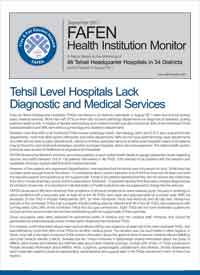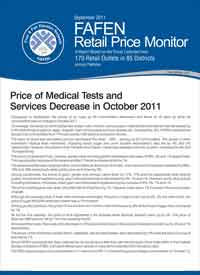ISLAMABAD, November 3, 2011: Forty-six Tehsil Headquarter Hospitals (THQs) monitored in 34 districts nationwide in August 2011 were found to be lacking basic medical services, according to a report released by Free and Fair Election Network (FAFEN) on Wednesday.
It said more than half – 57% – of them did not have pathology departments while 40% of the monitored THQs lacked pediatrics and 38% were without gynecology and obstetrics departments.
Similarly, more than 90% of all monitored THQs lacked cardiology (heart), dermatology (skin) and E.N.T. (ear, nose and throat) departments, more than 80% lacked orthopedic and chest departments, and 66% and 26% did not have ophthalmology (eye) and surgery departments respectively. Absence of these specialist services at THQs means that patients may be forced to seek treatment elsewhere, possibly from private hospitals, which are more expensive.
FAFEN Governance Monitors visited 46 THQs in 34 districts in August 2011 – 27 in 17 districts in Punjab, nine in as many districts in Khyber Pakhtunkhwa (KP), eight in six districts in Sindh and two in as many districts in Balochistan.
The report said conditions of physical infrastructure were relatively good. Housed in buildings with a boundary wall, at least 40 of the 46 THQs were clean and approachable by a proper road. With the exception of one THQ in KP, all other monitored THQs had electricity. As all had fans, ninety-four percent of the monitored THQs had a properly shaded waiting area for patients. Though 40 of the 46 THQs had washrooms with running water, only 28% had Sui gas connections. Eight THQs did not have residential quarters for doctors and the same number lacked residential quarters for support staff on their premises.
The report said FAFEN monitors interview up to three patients at each visited health facility to gauge satisfaction levels about doctors’ and staff’s behavior. Out of 135 patients interviewed in 46 THQs, 73% seemed to be satisfied with the behavior and availability of doctor, support staff and other medical services.
However, of the patients who expressed dissatisfaction, eight reported that the doctor was not present on duty, 19 felt they had not been given enough time by the doctor, 14 complained about doctor’s behavior and 23 felt that they had not been provided the required support and guidance by the support staff.
A total of 35 patients reported that they did not receive free medicines from the in-house pharmacy as per doctor’s prescription. Moreover, 13 patients reported that they were charged illegal money for provision of services. It is important to note that the state-run health institutions are not supposed to charge fees for services.
Though good occupancy rates were observed for sanctioned posts of medical and non medical staff, the report said the monitored THQs were reluctant to share information.
For instance, in KP only information about the postings and appointments of male medical officers (MOs) was shared by at least half of the monitored THQs. Similarly, in Balochistan, THQs only provided information about women medical officers (WMOs), MOs and dentists. In Sindh also, information about WMOs, chief medical officers (CMOs), MOs and anesthetists only was shared by at least half of the monitored THQs. The trend continued in Punjab where information only about posting and appointments of WMOs, MOs, surgeons, gynecologists, pediatricians and dentists was shared by at least 50% of the monitored THQs.
The report said elected representatives and government officials made 66 visits to the monitored THQs in June to August this year.
To download complete report, click here



